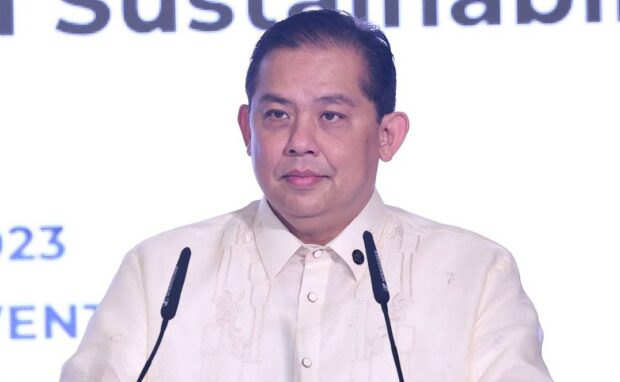MANILA, Philippines — Leaders of political parties in the House of Representatives formed a united front on Monday in favor of efforts to amend the 1987 Constitution through the Senate’s Resolution of Both Houses (RBH) No. 6, which had been sidelined by a political uproar over a parallel drive for a people’s initiative.
The party leaders expressed their collective support for RBH No. 6, which seeks to amend Articles 12, 14, and 16 of the 37-year-old Constitution, saying this would help spur the economy and attract foreign investment.
“We address recent misapprehensions and misunderstandings on the need to amend the Constitution with a call for unity and constructive dialogue, the key to sustained reform and national advancement,” the manifesto reads in part.
“As representatives of the diverse voices within the House of Representatives, we unite to champion the pillars of democracy that our nation holds dear,” the party leaders said.
The manifesto said the discourse on the proposed constitutional changes “necessitates a clear and unified voice from us on these pivotal issues.”
“Acknowledging the critical need for economic revitalization, we advocate for a strategic reassessment of the economic clauses in our Constitution. Our aim is clear: to foster an environment conducive to increased foreign investment and economic diversity,” it said.
‘Historic endeavor’
“Our collaboration with the Senate, manifest in Resolution of Both Houses No. 6… is a testament to our shared commitment to nurturing an economic landscape that is dynamic, inclusive, and forward-thinking, ensuring that prosperity reaches every corner of our nation,” it added.
The party leaders said they remained steadfast “in our commitment to support the historic endeavor of the Senate in its approval of the Resolution of Both Houses No. 6.”
“[And] together with our dear Speaker, Honorable Ferdinand Martin G. Romualdez, we stand firm in our commitment to approve RBH No. 6 in the House of Representatives,” they said.
RBH No. 6 was introduced by Senate leaders earlier this month “to avert a constitutional crisis between the House of Representatives and the Senate,” Senate President Juan Miguel Zubiri said.
The Senate resolution is limited to “three topics on economic provisions. We are doing this to preserve the bicameralism of [Congress],” he said.
Romualdez had expressed his “unwavering support” for the Senate’s initiative.
Response to PI
Under the resolution, the proposed constitutional changes should only cover Section 11 of Article 12, which requires 60-percent Filipino ownership of public utilities; Section 4 (2) of Article 14 (Education), which requires 60-percent Filipino ownership of educational institutions; and Section 11 (2) of Article 16 (General Provisions), which requires 70-percent Filipino ownership of any enterprise in the advertising industry.
The resolution was filed in response to a separate petition for Charter change via people’s initiative (PI) led by the People’s Initiative for Reform Modernization and Action (Pirma) that had been gathering signatures nationwide.
Senators were alarmed over reports that the people’s initiative was intended to amend the Constitution so that the two chambers of Congress would be authorized to change the Charter by a three-fourths vote of all members “jointly.”
On Jan. 23, the senators unanimously signed a manifesto rejecting the people’s initiative, as joint voting would result in the 24-member Senate being vastly outnumbered by over 300 House members.
The Constitution does not explicitly state whether voting for any constitutional amendment is supposed to be done jointly or separately.


